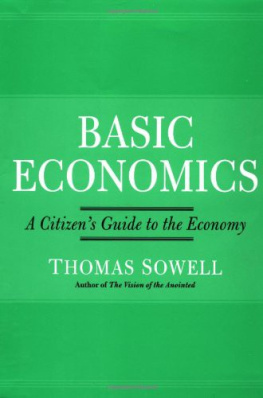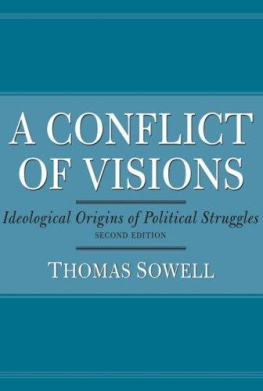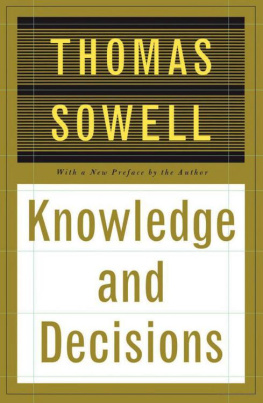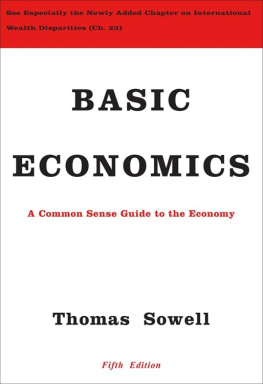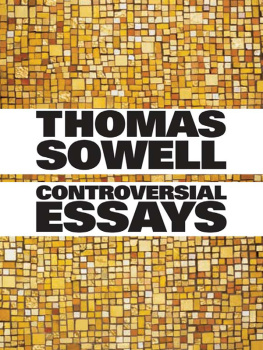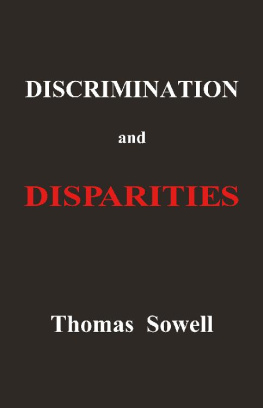BARBARIANS INSIDE THE GATES
BARBARIANS
INSIDE
THE GATES
and Other Controversial Essays
Thomas Sowell




CONTENTS
ix
PART 1: THE SOCIAL SCENE
PART II: THE ECONOMIC SCENE
PART III: THE POLITICAL SCENE
PART IV: THE LEGAL SCENE
PART V: THE RACIAL SCENE
PART VI: THE EDUCATION SCENE
PART VII: RANDOM THOUGHTS
INTRODUCTION
Be that as it may, what all these writings have in common is that they permit me to address a general audience without having to guard against having academics misconstrue every sentence that isn't hedged and footnoted. In other words, common sense can be assumed when writing for the general public, though not when writing for specialists with their own hobby horses and axes to grind. If I say that the sky is blue, the average reader will understand what I mean, but clever sophisticates will point out that the sky is reddish at sunset, black at midnight and gray on an overcast day.
Once freed from the need to be constantly fending off the wordtwisters, I find that a lot can be said in a brief essay, even on some pretty complex issues. Many laments that the public "doesn't understand" could more accurately be restated as "specialists have not bothered to talk in plain English." The public will not understand that two plus two equals four, if it is expressed in Chinese, but that does not mean that people are incapable of doing arithmetic.
If the title of this book suggests that I think we are facing a dire threat to the social fabric of this country, it is because I do. Some of the reasons will become apparent in the essays that follow. However, it may nevertheless be useful to make a distinction between pessimism and despair. Those of us old enough to be privileged to have lived through the great deliverances of the twentieth century-the collapse of Jim Crow in the United States and of apartheid in South Africa, the defeat of the Nazis on the battlefields of World War II, and the collapse of Communism in Eastern Europe-have no right to despair because our society is troubled today. Indeed, we have a duty to fight against the signs of decay and corruption around us.
Even if victory seems nowhere on the horizon, think of the all the soldiers who gave their young lives, all across this planet, during World War II, when the ultimate outcome was by no means certain and the triumph of unspeakable evil seemed very possible. Think of all those who died lonely and ugly deaths in the gulags of Siberia or in the killing fields of Kampuchea, without even a speck of dignity for themselves or a sign of hope of common decency for others in their societies.
Our task is infinitely easier than that, our dangers nothing worse than unpopularity, and our society one that has already conquered many obstacles and is capable of overcoming many more.
Finally, let me express my appreciation to Creators Syndicate, which syndicates my column to newspapers across the country, and to Forbes magazine, for their kind permission to reprint these columns here. A special thanks must go to Katherine Searcy of Creator's Syndicate, whose sharp editorial eye has saved me from many an embarrassing mistake. Gratitude is also owed to my research assistant, Na Liu, who has tracked down and gotten innumerable books, Census reports, scholarly articles, trade association publications, and other sources of information, and whose diligent research in libraries and on the Internet has unearthed many of the facts that I write about as if they were things I had at my fingertips all the time.
PART I
THE SOCIAL
SCENE
BARBARIANS INSIDE
THE GATES?
IS IT HOPELESS?
That is the question that seems implicit-and often explicit-in discussions of the degeneration of American society and of Western civilization.
The signs of this degeneration are all too plain and all too widespread, from declining educational standards to high crime rates, the disintegration of families and record rates of suicide among young people. Able-bodied beggars have become a common sight in American cities from San Francisco to Washington, as well as in such foreign capitals as London and Paris.
Senator Pat Moynihan recently pointed out that handgun murders in New York City are now 30 times what they were half a century ago. Racial polarization has also become far more common on elite college campuses than it was 30 years ago, and segregated living arrangements have been created by college administrators who publicly proclaim their devotion to "diversity" almost hourly.
Perhaps worst of all, much of the degeneracy of our times is not merely tolerated but celebrated.
The ugly, ignorant and barbaric lyrics of "rap" music have been sanctified by benedictions in the columns of the New York Times and by Ph.D.s teaching at Ivy League universities. Multiple murderers are mourned at their executions and a child molester on the faculty of Stanford University had a medal struck in his honor after he committed suicide when confronted with his crime.



